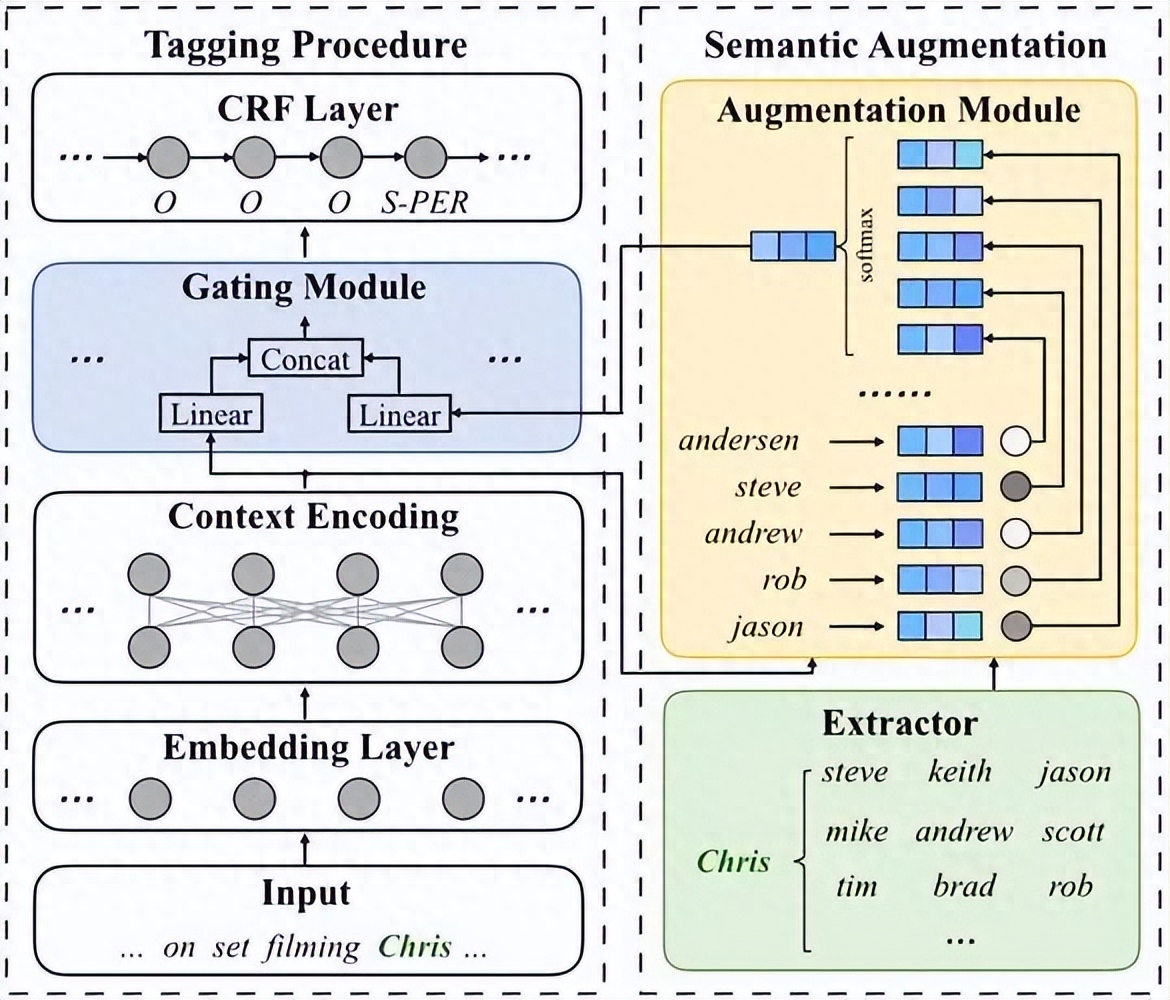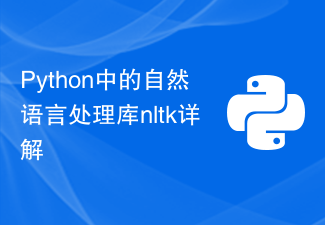Natural language processing with C++ involves installing the Boost.Regex, ICU and pugixml libraries. The article details the creation of a stemmer, which reduces words to their root words, and a bag-of-words model, which represents text as word frequency vectors. Demonstrates the use of word segmentation, stemming, and bag-of-word models to analyze text and output the segmented words, word stems, and word frequencies.

Using C++ for natural language processing and text analysis
Natural language processing (NLP) is a field that uses computers to process, analyze and generate human language. The discipline of the task. This article explains how to use the C++ programming language for NLP and text analysis.
Install the necessary libraries
You need to install the following libraries:
- Boost.Regex
- ICU for C++
- pugixml
The command to install these libraries on Ubuntu is as follows:
sudo apt install libboost-regex-dev libicu-dev libpugixml-dev
Create a stemmer
A stemmer is used to reduce words to their root words.
#include <boost/algorithm/string/replace.hpp>
#include <iostream>
#include <map>
std::map<std::string, std::string> stemmer_map = {
{"ing", ""},
{"ed", ""},
{"es", ""},
{"s", ""}
};
std::string stem(const std::string& word) {
std::string stemmed_word = word;
for (auto& rule : stemmer_map) {
boost::replace_all(stemmed_word, rule.first, rule.second);
}
return stemmed_word;
}Create a bag-of-words model
The bag-of-words model is a model that represents text as a word frequency vector.
#include <map>
#include <string>
#include <vector>
std::map<std::string, int> create_bag_of_words(const std::vector<std::string>& tokens) {
std::map<std::string, int> bag_of_words;
for (const auto& token : tokens) {
std::string stemmed_token = stem(token);
bag_of_words[stemmed_token]++;
}
return bag_of_words;
}Practical case
The following is a demonstration of text analysis using the above code:
#include <iostream>
#include <vector>
std::vector<std::string> tokenize(const std::string& text) {
// 将文本按空格和句点分词
std::vector<std::string> tokens;
std::istringstream iss(text);
std::string token;
while (iss >> token) {
tokens.push_back(token);
}
return tokens;
}
int main() {
std::string text = "Natural language processing is a subfield of linguistics, computer science, information engineering, and artificial intelligence concerned with the interactions between computers and human (natural) languages.";
// 分词并词干化
std::vector<std::string> tokens = tokenize(text);
for (auto& token : tokens) {
std::cout << stem(token) << " ";
}
std::cout << std::endl;
// 创建词袋模型
std::map<std::string, int> bag_of_words = create_bag_of_words(tokens);
for (const auto& [word, count] : bag_of_words) {
std::cout << word << ": " << count << std::endl;
}
}Output:
nat lang process subfield linguist comput sci inf engin artifi intell concern interact comput hum nat lang nat: 1 lang: 2 process: 1 subfield: 1 linguist: 1 comput: 1 sci: 1 inf: 1 engin: 1 artifi: 1 intell: 1 concern: 1 interact: 1 hum: 1
The above is the detailed content of How to use C++ for natural language processing and text analysis?. For more information, please follow other related articles on the PHP Chinese website!
 PHP中的自然语言处理入门指南Jun 11, 2023 pm 06:30 PM
PHP中的自然语言处理入门指南Jun 11, 2023 pm 06:30 PM随着人工智能技术的发展,自然语言处理(NaturalLanguageProcessing,NLP)已经成为了一项非常重要的技术。NLP可以帮助我们更好地理解和分析人类语言,从而实现一些自动化的任务,比如智能客服、情感分析、机器翻译等。在本文中,我们将介绍使用PHP进行自然语言处理的基本知识和工具。什么是自然语言处理自然语言处理是一种利用人工智能技术来处
 基于Java的自然语言处理中的命名实体识别和关系抽取技术和应用Jun 18, 2023 am 09:43 AM
基于Java的自然语言处理中的命名实体识别和关系抽取技术和应用Jun 18, 2023 am 09:43 AM随着互联网时代的到来,大量的文本信息涌入我们的视野,随之而来的是人们对于信息的处理和分析需求的不断增长。同时,互联网时代也带来了自然语言处理技术的快速发展,使得人们能够更好地从文本中获取有价值的信息。其中,命名实体识别和关系抽取技术是自然语言处理应用领域的重要研究方向之一。一、命名实体识别技术命名实体指的是人、地点、组织、时间、货币、百科知识、计量术语、专业
 自然语言处理:使计算机理解和处理人类语言Sep 21, 2023 pm 03:53 PM
自然语言处理:使计算机理解和处理人类语言Sep 21, 2023 pm 03:53 PM自然语言处理(NaturalLanguageProcessing,NLP)是人工智能领域中一项重要而令人兴奋的技术,其目标是使计算机能够理解、解析和生成人类语言。NLP的发展已经取得了巨大的进步,使得计算机能够更好地与人类交互,实现更广泛的应用。本文将探讨自然语言处理的概念、技术、应用以及未来展望自然语言处理的概念自然语言处理是一门研究如何使计算机能够理解和处理人类语言的学科。人类语言的复杂性和多义性使得计算机在理解和处理上面临巨大挑战。NLP的目标是开发算法和模型,使计算机能够从文本中提取信息
 在Linux系统上使用IntelliJ IDEA进行自然语言处理的配置方法Jul 05, 2023 pm 10:45 PM
在Linux系统上使用IntelliJ IDEA进行自然语言处理的配置方法Jul 05, 2023 pm 10:45 PM在Linux系统上使用IntelliJIDEA进行自然语言处理的配置方法IntelliJIDEA是一款功能强大的集成开发环境(IDE),适用于多种编程语言。本文将介绍如何在Linux系统上配置IntelliJIDEA,以便于进行自然语言处理(NLP)的开发。步骤一:下载和安装IntelliJIDEA首先,我们需要前往官方网站https://www.
 如何使用Java构建一个基于自然语言处理的智能文本生成应用程序Jun 27, 2023 am 11:43 AM
如何使用Java构建一个基于自然语言处理的智能文本生成应用程序Jun 27, 2023 am 11:43 AM随着人工智能技术的飞速发展,自然语言处理(NaturalLanguageProcessing)在各个领域得到了广泛的应用。在文本生成领域,自然语言处理技术可以用来自动化创建高质量的文本内容,从而提升工作效率和文本质量。本文将介绍如何使用Java构建一个基于自然语言处理的智能文本生成应用程序。一、理解自然语言处理技术自然语言处理技术是指让计算机能够识别、理
 如何使用C++进行高效的自然语言处理?Aug 26, 2023 pm 02:03 PM
如何使用C++进行高效的自然语言处理?Aug 26, 2023 pm 02:03 PM如何使用C++进行高效的自然语言处理?自然语言处理(NaturalLanguageProcessing,NLP)是人工智能领域中的重要研究方向,涉及到处理和理解人类自然语言的能力。在NLP中,C++是一种常用的编程语言,因为它具有高效和强大的计算能力。本文将介绍如何使用C++进行高效的自然语言处理,并提供一些示例代码。准备工作在开始之前,首先需要准备一些
 Python中的自然语言处理库nltk详解Jun 10, 2023 pm 12:25 PM
Python中的自然语言处理库nltk详解Jun 10, 2023 pm 12:25 PMPython是一种非常强大的编程语言,支持各种应用程序和领域,包括自然语言处理(NLP)。Python的自然语言处理库nltk(NaturalLanguageToolkit)是一种支持自然语言处理的Python库,它提供了许多功能和算法来分析、操作和生成人类语言的文本数据。nltk库包含了各种预处理工具、语法分析器、语义分析器、词汇资源等功能,并采用P
 基于Langchain、ChromaDB和GPT 3.5实现检索增强生成Sep 14, 2023 pm 02:21 PM
基于Langchain、ChromaDB和GPT 3.5实现检索增强生成Sep 14, 2023 pm 02:21 PM译者|朱先忠重楼|审校摘要:在本博客中,我们将了解一种名为检索增强生成(retrievalaugmentedgeneration)的提示工程技术,并将基于Langchain、ChromaDB和GPT3.5的组合来实现这种技术。动机随着GPT-3等基于转换器的大数据模型的出现,自然语言处理(NLP)领域取得了重大突破。这些语言模型能够生成类似人类的文本,并已有各种各样的应用程序,如聊天机器人、内容生成和翻译等。然而,当涉及到专业化和特定于客户的信息的企业应用场景时,传统的语言模型可能满足不了要求。


Hot AI Tools

Undresser.AI Undress
AI-powered app for creating realistic nude photos

AI Clothes Remover
Online AI tool for removing clothes from photos.

Undress AI Tool
Undress images for free

Clothoff.io
AI clothes remover

AI Hentai Generator
Generate AI Hentai for free.

Hot Article

Hot Tools

PhpStorm Mac version
The latest (2018.2.1) professional PHP integrated development tool

Dreamweaver Mac version
Visual web development tools

SecLists
SecLists is the ultimate security tester's companion. It is a collection of various types of lists that are frequently used during security assessments, all in one place. SecLists helps make security testing more efficient and productive by conveniently providing all the lists a security tester might need. List types include usernames, passwords, URLs, fuzzing payloads, sensitive data patterns, web shells, and more. The tester can simply pull this repository onto a new test machine and he will have access to every type of list he needs.

DVWA
Damn Vulnerable Web App (DVWA) is a PHP/MySQL web application that is very vulnerable. Its main goals are to be an aid for security professionals to test their skills and tools in a legal environment, to help web developers better understand the process of securing web applications, and to help teachers/students teach/learn in a classroom environment Web application security. The goal of DVWA is to practice some of the most common web vulnerabilities through a simple and straightforward interface, with varying degrees of difficulty. Please note that this software

MinGW - Minimalist GNU for Windows
This project is in the process of being migrated to osdn.net/projects/mingw, you can continue to follow us there. MinGW: A native Windows port of the GNU Compiler Collection (GCC), freely distributable import libraries and header files for building native Windows applications; includes extensions to the MSVC runtime to support C99 functionality. All MinGW software can run on 64-bit Windows platforms.







